The Windows 10 Review: The Old & New Face of Windows
by Brett Howse on August 25, 2015 8:00 AM EST- Posted in
- Operating Systems
- Microsoft
- Windows 10
Windows 10 Editions
Branding Windows has been somewhat hit and miss over the last couple of generations. Microsoft took the entire exercise a bit too far over the Windows Vista and Windows 7 period, with a lot of different versions that had different features available. With Windows 8, they moved to just a couple of different versions which simplified the selection. Windows 8 Core was the one most people needed, and Pro offered a few more features that most home users would not need, such as the ability to join a domain, or use Remote Desktop. There was also an edition for volume license customers called Enterprise, and it contained every feature.
Windows 10 continues down this path, but rebrands the home version Home again. That makes a lot of sense since the “core” branding on Windows 8 was kind of silly.
Once again, there are two basic versions which you can purchase. Windows 10 Home, and Windows 10 Pro are both going to be offered in retail sales, and once again there is a volume license version called Enterprise, and another carryover from is a special version of Enterprise for education, called, you guessed it, Education.
Education and Enterprise are almost identical, with only a couple of differences. But most of us are going to be using Windows 10 Home or Pro.
As before, Windows 10 Home is a subset of Pro, with Pro offering features that are aimed more towards business users. The one big exception is Bitlocker support, which is Microsoft’s drive encryption software. Many people were hoping to see this come to the Home version for this round, but alas, that is not the case.
All versions except Home also support a new Windows Update for Business service, which is a method for companies to deploy and manage updates. Windows Server Update Services is the existing method for this, and that also still exists for customers who want to keep that level of control.
Speaking of updates, Windows 10 no longer offers a way to disable Windows Updates in the settings page. Pro will let you defer feature updates, but not security updates, and Enterprise versions will offer a long term servicing branch option, but the goal here is to keep Windows up to date going forward.


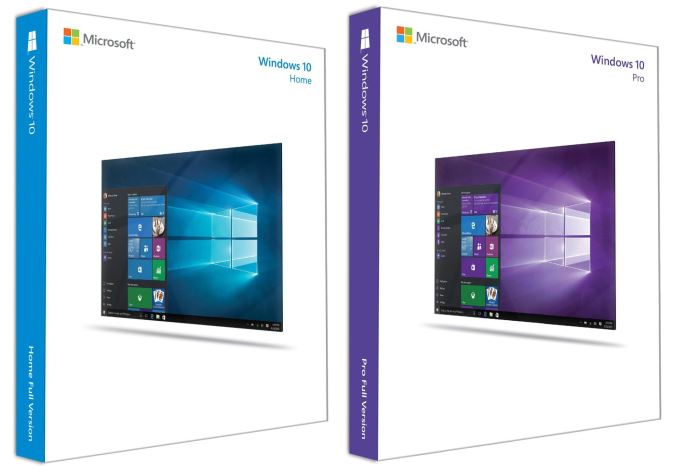
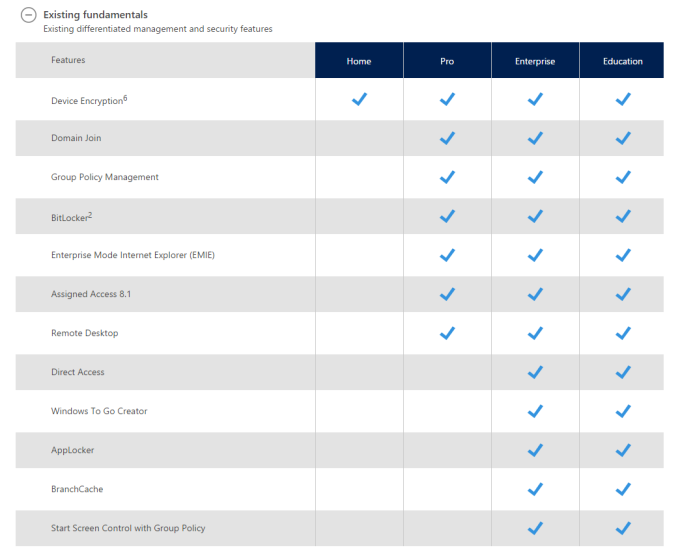
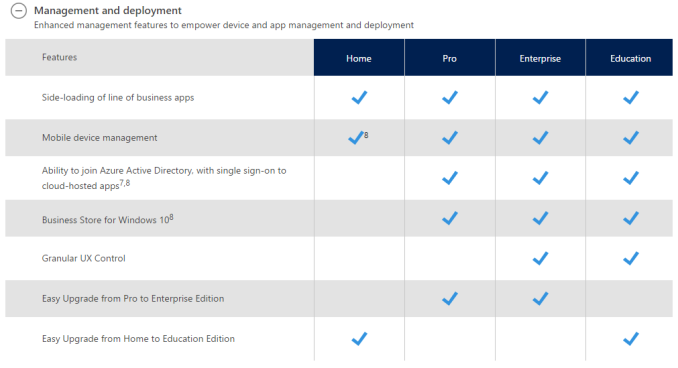
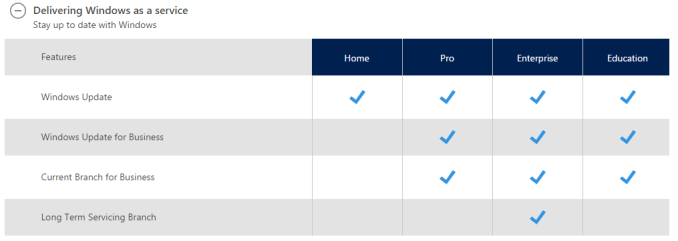
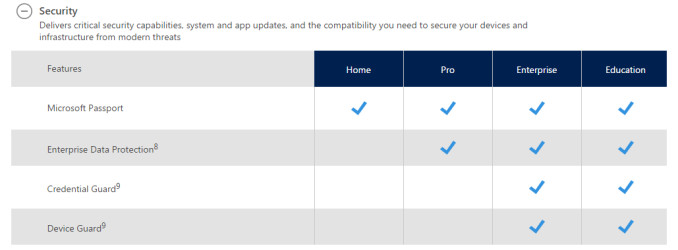








293 Comments
View All Comments
prophet001 - Tuesday, August 25, 2015 - link
The spyware aspect of this OS bothers me. I'll be using Windows 7 until this is reconsidered.Michael Bay - Tuesday, August 25, 2015 - link
So, the same spyware.prophet001 - Tuesday, August 25, 2015 - link
Windows 7 doesn't even begin to approach this level of intrusion.Michael Bay - Tuesday, August 25, 2015 - link
As long as you believe that.wishgranter - Tuesday, August 25, 2015 - link
The Windows 10 EULA and Microsoft's Privacy Statement declare that Microsoft will access and use the content of people's emails and other files, such as documents uploaded to One Drive, according to Microsoft's discretion. "Share with our partners" also includes law enforcement, wherever Microsoft deems required. And I think Microsoft cannot ignore any instance which they feel should be forwarded to law enforcement without making themselves complicit in any potential criminal activity.Windows 10's all-your-contents-are-belongs-to-us policy is also a widening of the backdoor which law enforcement asks OS manufacturer to build into their systems.
Basically, Microsoft's Windows 10 EULA claims that all files used in Windows 10 may be accessed, searched, and contents utilized by Microsoft, with Microsoft exercizing sole discretion over what it will access, and how it will be used.
I think all businesses, content creators, and even nations should be dismayed at this. It looks like Russia already is concerned with Windows 10's always-on espionage against its users:
http://www.rt.com/politics/312172-windo ... ent-stirs/
If people will recall, Microsoft was previously found to be snooping in people's Outlook emails, and this discovery caused a furor among people, leading to Microsoft saying they would not do this anymore:
http://www.wired.com/2014/03/microsoft_vigilante/1
http://www.theverge.com/2014/3/20/55314 ... l-policies2
But now, Microsoft has made it a guaranteed policy of Windows 10 that they will always do this:
https://www.microsoft.com/en-gb/privacy ... fault.aspx
"Content. We collect content of your files and communications when necessary to provide you with the services you use. This includes: the content of your documents, photos, music or video you upload to a Microsoft service such as OneDrive. It also includes the content of your communications sent or received using Microsoft services, such as the:
- subject line and body of an email,
- text or other content of an instant message,
- audio and video recording of a video message, and
- audio recording and transcript of a voice message you receive or a text message you dictate."
Shouldn't there be a much bigger furor over the discretionless snooping of Windows 10, which includes all Outlook emails, than there was over just Outlook on its own?
Are people OK with their PCs contents no longer being their sole domain and in their privacy, but instead being fully open to Microsoft?
I'm not. I'll be sticking with Windows 7 for now.
Windows 10's motto: Your System is not Your Own
xenol - Tuesday, August 25, 2015 - link
You're reading the TP EULA. The actual Windows 10 EULA is at http://www.microsoft.com/en-us/Useterms/Retail/Win... , which defers the privacy stuff to Microsoft's privacy statement ( https://www.microsoft.com/en-us/privacystatement/ )Which says none or few of the things in the TP EULA (the only one I found in common is they may look at anything you upload to OneDrive, which you can disable on Windows 10 anyway)
Grooveriding - Tuesday, August 25, 2015 - link
Really unfortunate how far Microsoft went with privacy invasion and data trolling with Win 10. Fortunately you can disable what appears to be all of it with options, registry tweaks and disabling services.I would also recommend running a draconian firewall such as Tinywall that blocks all internet traffic and you have to allow applications on a case by case basis. As well as editing your hosts file to block all traffic back to Microsoft's data collection servers. As well, never use the OS with an MS account, just use a local account.
Pretty outrageous MS does not offer an option to disable everything without having to resort to these measures.
hansmuff - Tuesday, August 25, 2015 - link
The "sharing with law enforcement" is automatic for any data Microsoft has. If you're on 7 and use OneDrive, well there you go.Regarding the recording of voice data, that's a given with all of them. Siri, Google, now MS all use online services to improve detection and of course otherwise use that data. And they all send your recorded voice in some form or shape to their servers.
I can see how you'd tie it to Windows 10 because that centralizes a lot of those "new generation" of services that are in the cloud. But those services exist with or without Windows 10. I think it's wiser to educate people about what "the cloud" implies, which is exactly what you say; people do not have control over the data they store.
It's a cloud issue, and the cloud has provided the perfect vehicle for the likes of Apple, Google and Microsoft to take what they want. This goes for your PC, phone, tablet, everything.
Notmyusualid - Tuesday, August 25, 2015 - link
None of my phones or PCs send anything to the cloud.It is called privacy common sense.
Matts8 - Tuesday, August 25, 2015 - link
What phone do you have?